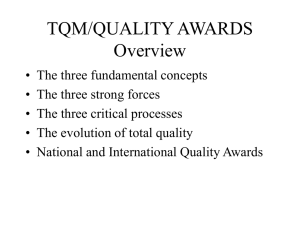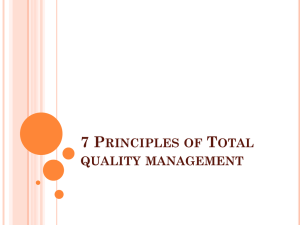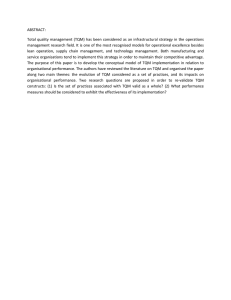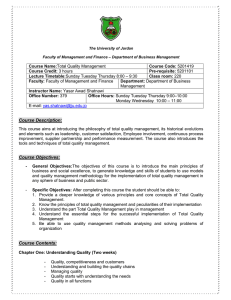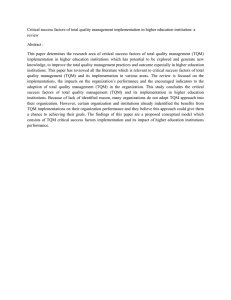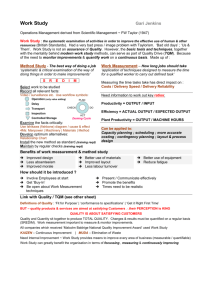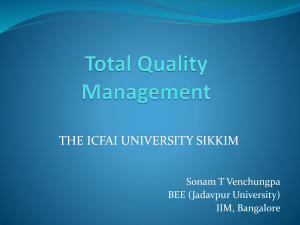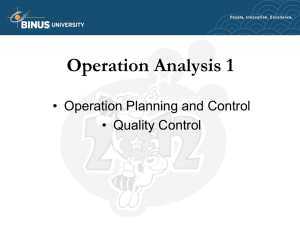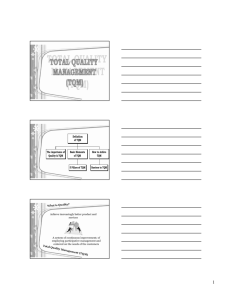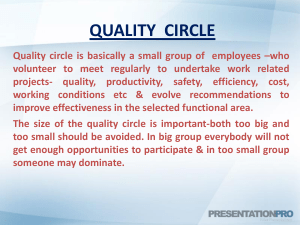File - fortrose biz ed
advertisement
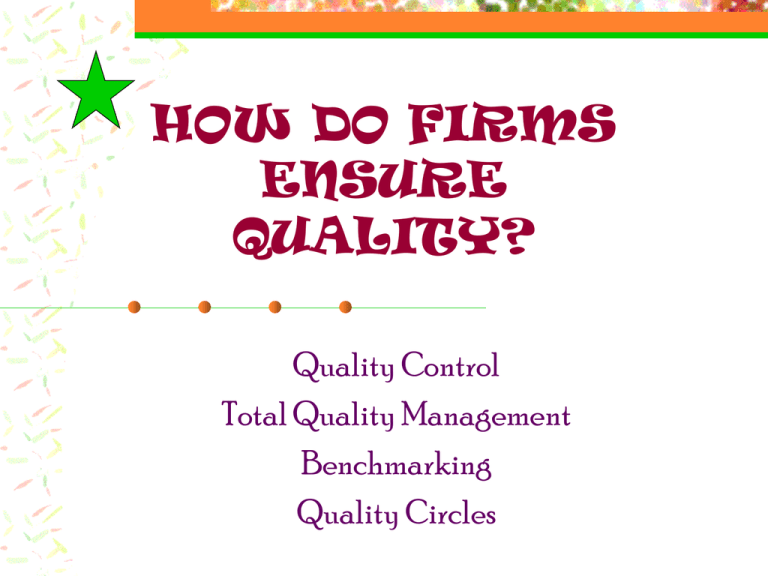
HOW DO FIRMS ENSURE QUALITY? Quality Control Total Quality Management Benchmarking Quality Circles What is Quality? Why is it important? Consumers are more aware Magazines publish reports Consumers have higher expectations Legislation Competition forces improvement Part of Kaizen and lean production Quality Control In the Production Dept Production Department ensures that products Satisfy consumer needs Work under the conditions they will face Can be produced cost effectively Can be repaired easily Conforms to safety standards 3 STAGES OF QUALITY CONTROL 1. Identify standards and set targets 2. Monitor standards – test products 3. Respond to findings 1. 2. 3. 4. 5. Remove a sample of cereal every half hour Test 50 samples twice a day Compare sample with the perfect product Grade given: 1-10 where 10 = perfect 7-10 = pass TRADITIONAL METHOD OF TESTIN G THE COMPLETED PRODUCT = WASTE Facts about Quality 1/3 of all effort in British business is wasted in correcting errors £4 billion is spent on this Obvious benefits of getting it right first time and not after the fact THE MODERN APPROACH TEST PRODUCT DURING PRODUCTION TO PREVENT FAULTS AND POOR QUALITY TOTAL QUALITY MANAGEMENT TQM What is TQM? A method designed to prevent errors and poor quality products The business ensures that the manufacturing process is investigated at every stage Success of Japanese companies based on this 100% of the organisation must be involved It is a business philosophy… Quality Chains In order to produce quality goods you must have Quality suppliers and raw materials Quality administration systems Quality equipment These elements make up a quality chain. Company Policy There will only be improvement if there is a company wide policy TQM must start at the top and spread through the business People must take pride in their job Everyone is accountable for their own performance TQM AND MOTIVATION Teamwork is the most effective way of solving problems ADVANTAGES ARE: Employee morale is often improved Problems are better dealt with A greater variety of problems can be dealt with in teams Team ideas are more likely to be accepted USING TQM TQM helps companies to Focus on the needs of the consumer Achieve quality n all aspects of the business Analyse all processes and remove waste Develop a team approach to problem solving Develop effective procedures for communications QUALITY CIRCLES Small groups of staff, usually from the same work area, who meet on a regular and voluntary basis They attempt to solve problems No discussion of other issues –just quality Must fulfil certain conditions Used in all Honda plants QUALITY CIRCLES A steering committee should be set up to oversee the programme A senior manager should chair the committee Team leaders should be properly trained Workers from various levels should be present Problems with TQM? Training and development It will only work with 100% commitment Increased paperwork due to regular audits Cost – design and development, monitoring, cost or trying again if system fails. BENCHMARKING BPB – Best Practice Benchmarking A technique used by some businesses to help them discover the ‘best’ methods of production and adopt them. Fid the best company Analyse their methods Equal their standards The steps:What should be benchmarked? Who should the company benchmark against? How will the info be used? How is the information obtained? How should the info be analysed? QUALITY STANDARDS BSI Kitemark Investors in people Scottish Tourist Board star system AA/RAC Lionmark Woolmark Marks that show a product has met a certain standard Benefits Fewer complaints received Loyalty from customers The customer places trust in the company Premium price can be charged See notes
